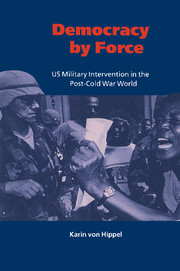Book contents
- Frontmatter
- Contents
- List of maps
- Acknowledgements
- List of abbreviations
- 1 Introduction: dangerous hubris
- 2 Invasion or intervention? Operation Just Cause
- 3 Disappointed and defeated in Somalia
- 4 Heartened in Haiti
- 5 UNPROFOR, IFOR and SFOR: can peace be FORced on Bosnia?
- 6 Hubris or progress: can democracy be forced?
- Bibliography
- Index
2 - Invasion or intervention? Operation Just Cause
Published online by Cambridge University Press: 22 September 2009
- Frontmatter
- Contents
- List of maps
- Acknowledgements
- List of abbreviations
- 1 Introduction: dangerous hubris
- 2 Invasion or intervention? Operation Just Cause
- 3 Disappointed and defeated in Somalia
- 4 Heartened in Haiti
- 5 UNPROFOR, IFOR and SFOR: can peace be FORced on Bosnia?
- 6 Hubris or progress: can democracy be forced?
- Bibliography
- Index
Summary
Just one year into his presidency, George Bush ordered the invasion of Panama, a decision that would have far-reaching implications not just for Panamanians, but also for the US government as it assumed its lone Superpower role. In many respects, this action had more in common with the US invasion of Grenada in 1983 and other Central American incursions than the post-Cold War interventions. The Panama and Grenada operations were allegedly undertaken to restore democracy, yet in neither case were democratic reforms high on the agenda, nor was either sanctioned at the UN. Panama differs, however, from the entanglements in the western hemisphere during the Reagan era because US troops landed just one month after the fall of the Berlin Wall: the Soviet menace could no longer provide the pretext, and even if it could, there were no communists threatening to take over the canal. US policy was about to move in an altogether different direction.
Subsequent large-scale, US military interference in international crises would be labelled interventions, as opposed to another Panama-style invasion, but the mistakes made prior to this operation, during the invasion itself, and in the post-conflict period taught US policy makers valuable lessons, particularly for the reconstruction phase. Some of these lessons would be brought into practice without delay, others would not be applied until Haiti and Bosnia, while still others are yet to be realised.
- Type
- Chapter
- Information
- Democracy by ForceUS Military Intervention in the Post-Cold War World, pp. 27 - 54Publisher: Cambridge University PressPrint publication year: 1999

